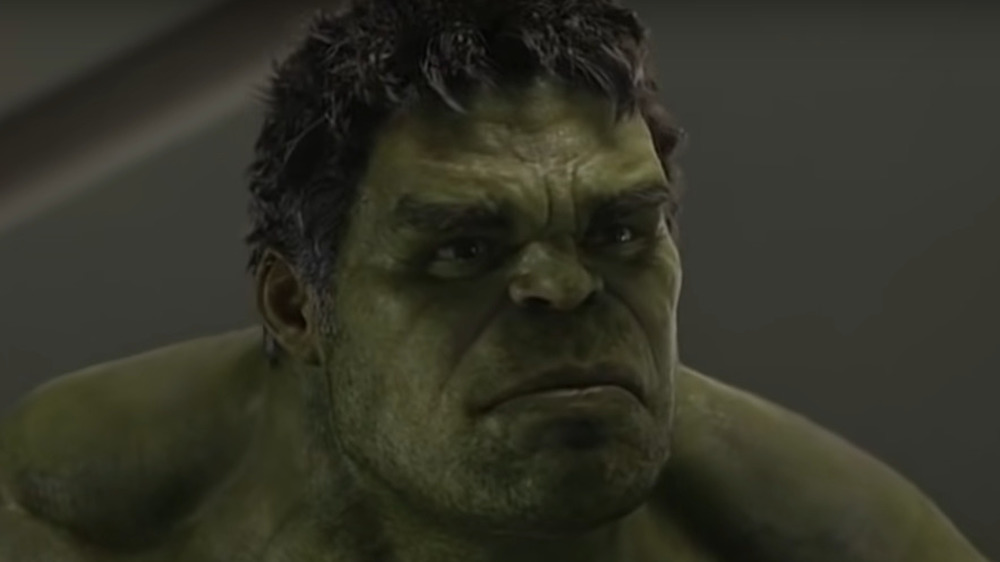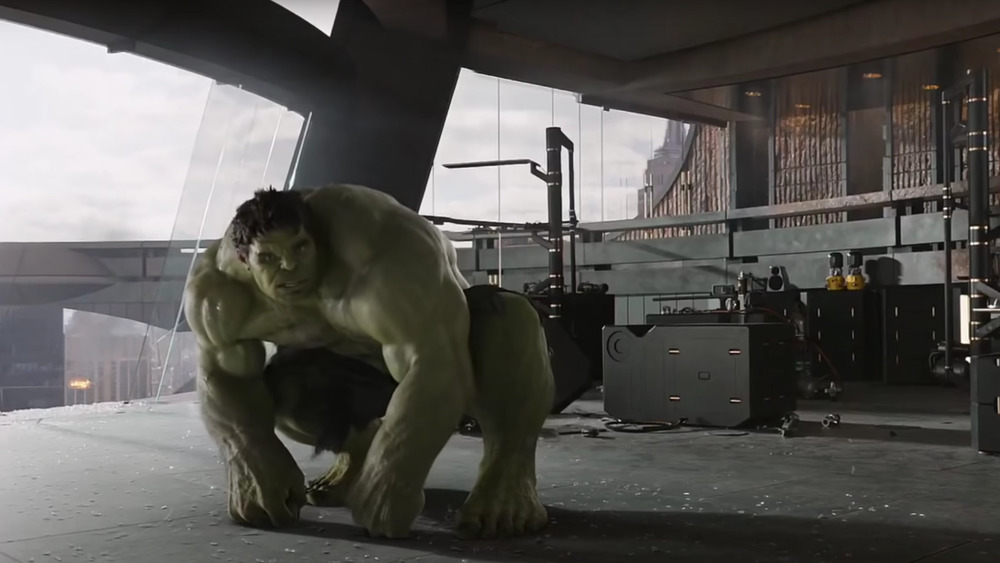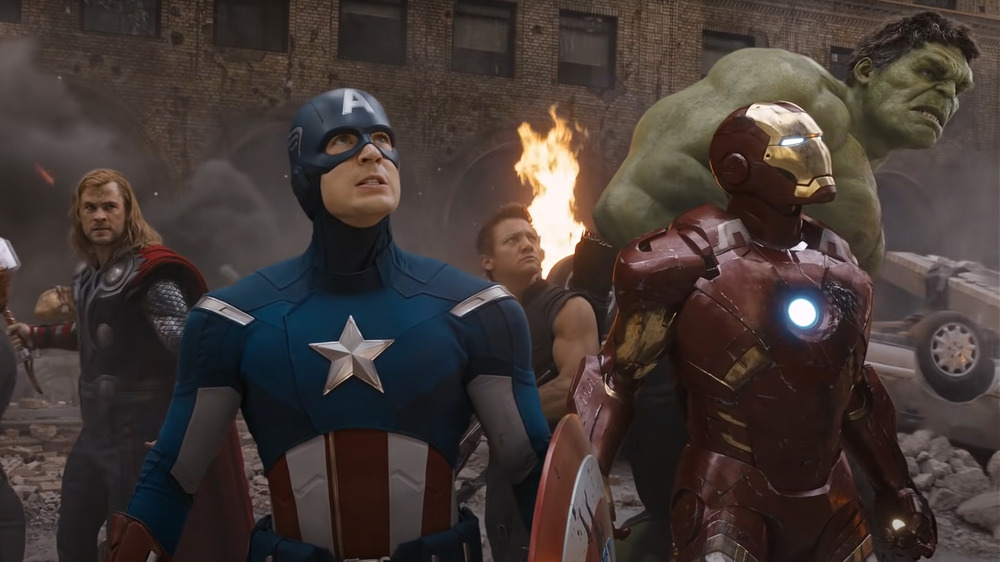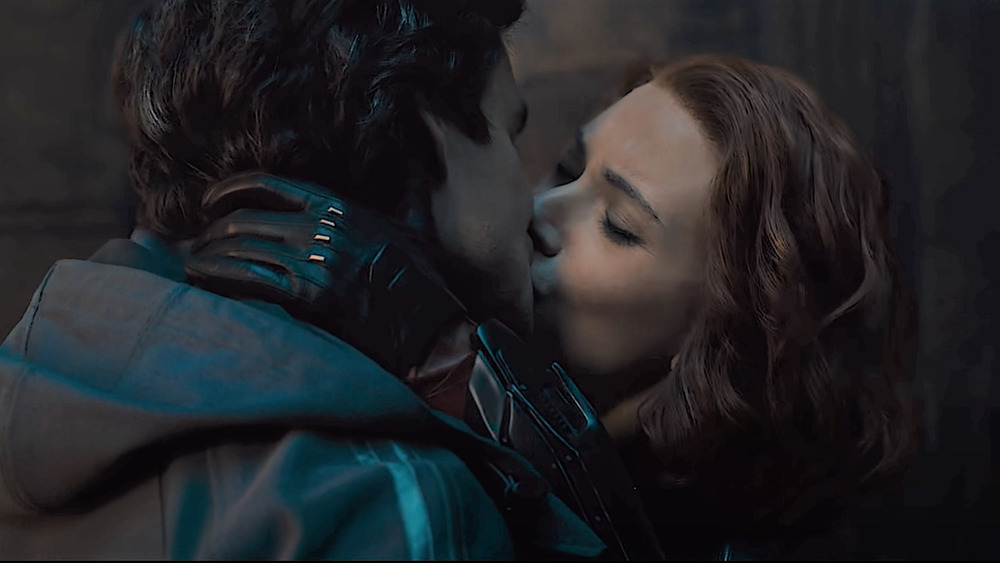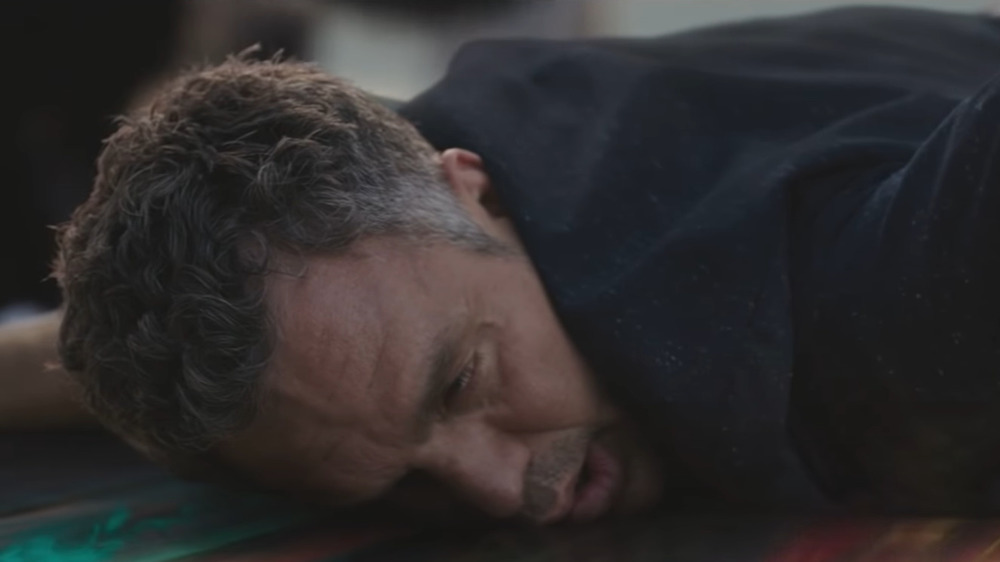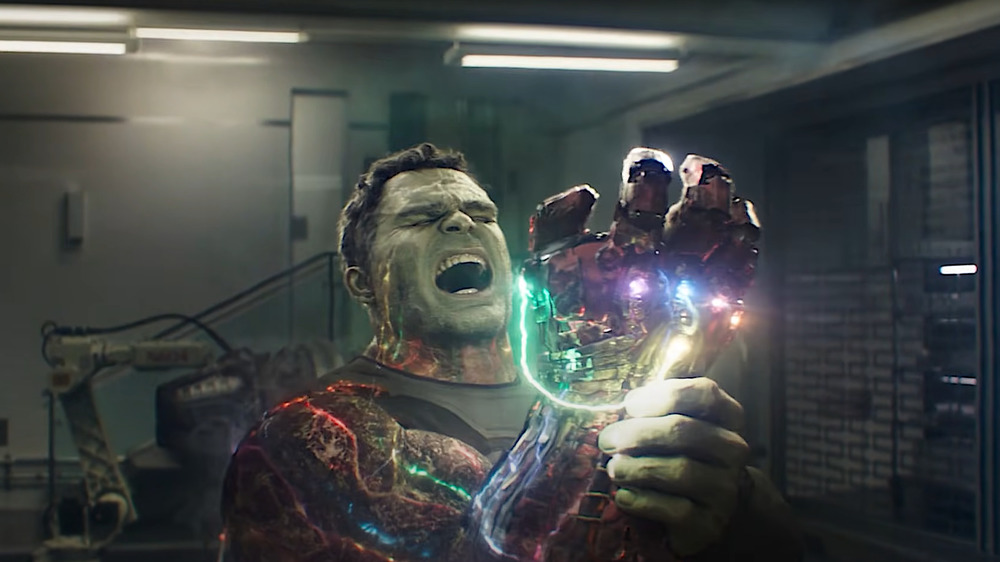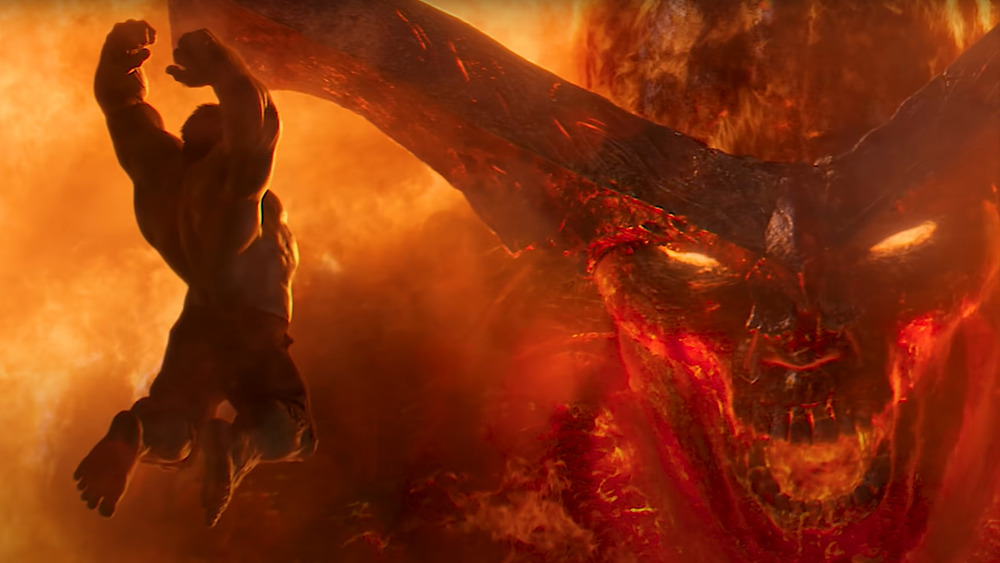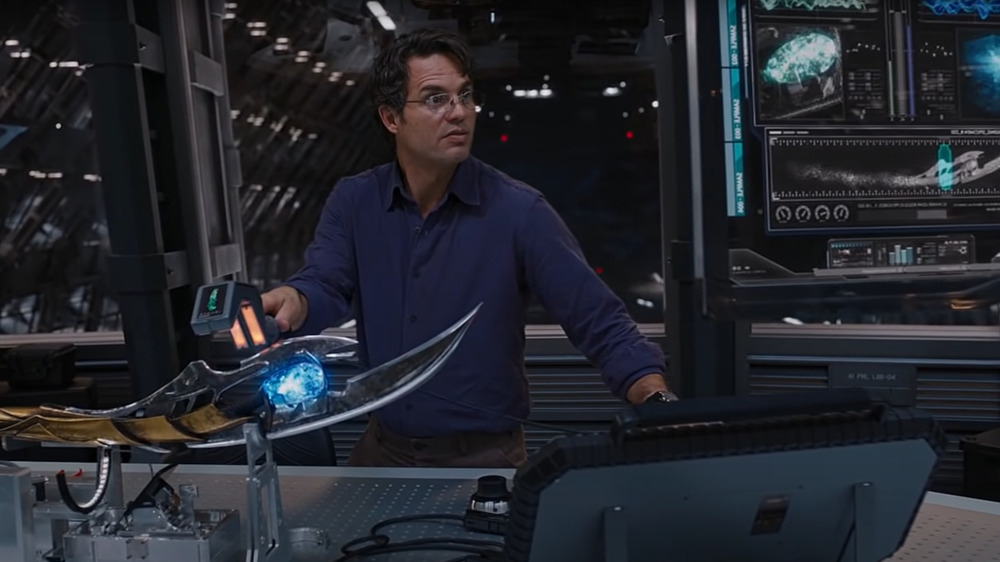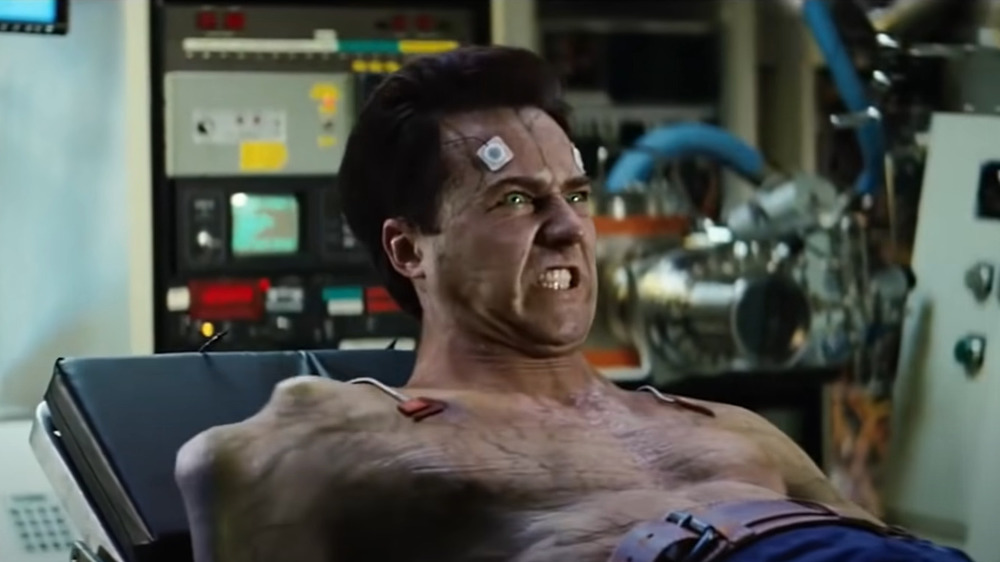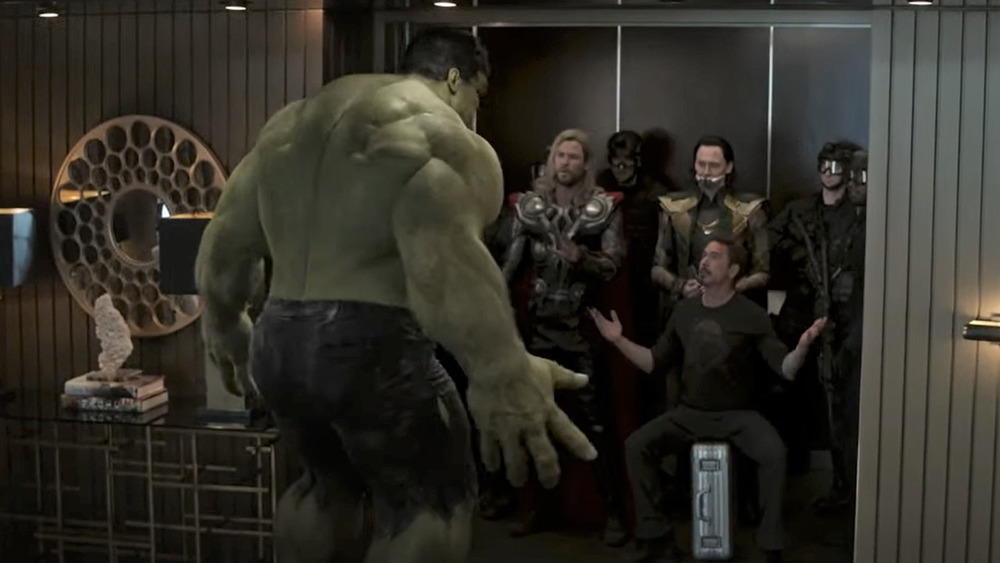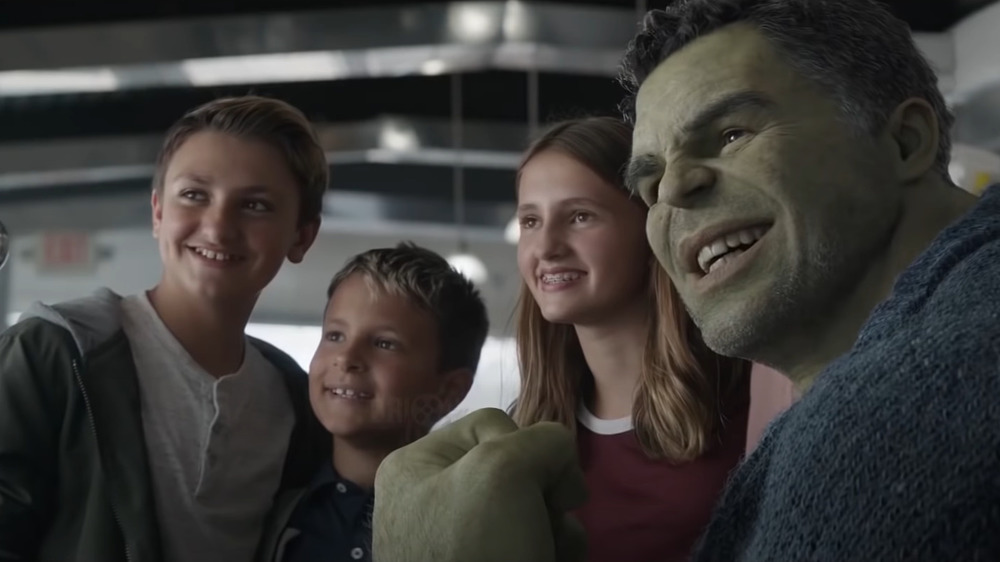Rules The Hulk Has To Follow In The MCU
Of all the characters to grace the Marvel Cinematic Universe, a world populated by aliens, wizards, monarchs, and gods, none is more unpredictable and implacable than the Hulk. In Marvel Comics, he was the Avengers' first opponent, a green-skinned monster fueled by fury and bent on the destruction of anything in his past, before joining the team as a superhero. In the MCU, he is the Avengers' ultimate weapon, a fearless force of nature in the body of one of Earth's most brilliant scientists. If an enemy is too powerful, the Hulk can defeat them. If a problem is impossible, Bruce Banner can solve it. In a realm where the rules are constantly changing, Hulk is bound by none of them, smashing through any barrier, physical or otherwise, he comes across.
And yet, there are rules in the MCU that apply even to the big guy himself. There might not be a building he can't knock down or a science experiment that wouldn't benefit from his expertise, but there are certain things that simply have to occur every time the Hulk appears in an MCU film. Whether he's being portrayed by Edward Norton or Mark Ruffalo, these are some of the rules the Hulk has to follow in the otherwise limitless shared universe that Marvel has ridden to box office dominance.
Spoilers for The Incredible Hulk, Thor: Ragnarok, and all four Avengers movies lie ahead, so if that will transform you into an unstoppable rage beast, stop reading now!
He needs no introduction
The Hulk is one of only seven characters first introduced to the MCU via their own solo film (the others are Iron Man, Thor, Captain America, Ant-Man, Doctor Strange, and Captain Marvel). However, 2008's The Incredible Hulk differs from five of those other six (except perhaps Captain Marvel) in one important regard: It's not an origin story. While we spend most of their respective films watching Tony build his suit, Thor prove his worth, and Cap become a legendary super-soldier, the tale of how Bruce Banner was transformed into the Hulk is knocked out in the opening credits, and none of the other movies featuring Hulk have expressed any interest in his origins. There's a good reason: The audience knows them already.
Unlike, say, Iron Man, who was a relatively obscure character to the general public prior to the launch of the MCU, the Hulk has been a pop culture phenomenon since 1978, when Bill Bixby and Lou Ferrigno portrayed him in the CBS TV show that remains, to this day, many people's strongest association with the character. He headlined an animated show in the 1980s, and another one in the '90s. Plus Ang Lee and Eric Bana brought Hulk to the big screen in 2003, just five years before The Incredible Hulk hit theaters. The Hulk is so entrenched in American pop culture that there's no need to waste time explaining him, freeing the MCU from the task of rehashing his origin story.
He's always pushed to the side
Unfortunately, part of being a cultural icon is that things can get complicated when it comes to intellectual property rights. The Avengers might be household names today, but it was their lack of widespread popularity in 2008 that led to them forming the foundation of the MCU, as more popular characters like Spider-Man, the X-Men, and the Fantastic Four were owned by other companies. The Hulk was one of those more popular characters, and his rights were held by Universal, the studio that had distributed the Ang Lee film. While Marvel was able to cut a deal with Universal to release The Incredible Hulk, they've thus far been unable to produce a standalone sequel, since Universal must distribute any film in which Hulk is the star.
As a result, since 2008, Hulk has operated under the rule that he must forever be a side character. Ironically, the most popular MCU hero this side of Spider-Man has been prevented from headlining a film franchise, his appearances instead limited to the four Avengers movies and Thor: Ragnarok. And when you think about it, the rule even applies to The Incredible Hulk itself, many elements of which have been retconned and ignored in the wider MCU. Even when some of the characters enjoy a resurgence in the upcoming She-Hulk series (in which Hulk will also appear as a side character) it will still be the only MCU movie you can't watch on Disney Plus.
He always has a love interest
Just because Hulk is no longer a leading man, that doesn't mean he has to strike out with the ladies. In fact, Bruce Banner is one of the only characters in the almost entirely sexless MCU to have multiple romantic attachments, which rear their head in every film he appears in. The Incredible Hulk features Betty Ross (Liv Tyler), the character he was primarily linked with before the MCU; a heart-racing attempt at intimacy between them in the film goes poorly. But Betty hasn't been seen since 2008, and in her absence, Bruce has been paired up with a very different character — Black Widow. The seeds of their relationship are planted when she first recruits him in The Avengers, and you can see them growing over the course of the film. In Avengers: Age of Ultron, their romance is made explicit and becomes a major part of the story, ending only with Hulk's disappearance following Ultron's defeat.
In Thor: Ragnarok, it's seeing the message from Black Widow that finally allows Banner to regain control after being dominated by Hulk for two full years. The film also introduces the character of Valkyrie, who flirts with both Hulk and Banner, not realizing they inhabit the same body. Hulk's relationships with Widow and Valkyrie come up in both Infinity War and Endgame, though with the former dead and the latter disinterested in his merged personalities, it seems like he might finally get the chance to be single.
He absolutely must fall off something
We don't make the rules here, we just point them out, and we dare you find an MCU movie involving the Hulk where he doesn't fall from someplace high. It's not just a great way of turning Bruce Banner into the Hulk, although that is an extremely common occurrence. In both The Incredible Hulk and Thor: Ragnarok, Banner jumps out of an air vehicle, in flight, in order to provoke the resurgence of his mean, green alter ego (though in Ragnarok, the effect is hilariously delayed). Meanwhile, in Age of Ultron, Black Widow herself pushes Banner off a ledge when she needs the assistance of "the other guy." But Hulk does have a tendency to rush into battle, and in a world like the MCU, sometimes that means you get tossed.
Hulk never did end up in the falling death trap Nick Fury designed as a contingency plan to kill him, but he still ended up sailing through the sky in The Avengers after tearing apart a moving fighter jet, which sent him flying when it exploded. In Infinity War, Heimdall transports him to Earth in dramatic fashion, as Doctor Strange and his sidekick, Wong, discover when Hulk crashes through the roof of their Sanctum in New York (ironically turning back into Banner in the process, a reversal of how things usually go). And in Endgame, when Thanos' ship destroys the New Avengers Facility, Hulk falls underground alongside Rocket Raccoon and War Machine.
Hulk is the strongest one there is
No matter how often he falls, there's one inescapable truth about Hulk: He's the strongest guy around. While the current iteration of the MCU arguably include characters that are more powerful — Captain Marvel, Doctor Strange, and even Wanda Maximoff come to mind — the movies are still largely structured around the idea that there is little, if anything, stronger than the Hulk. This trend obviously begins in The Incredible Hulk and continues in The Avengers, whose plot structure is almost entirely centered around whether or not Bruce Banner has enough control over his alter ego to be the team's trump card in combat. Age of Ultron refines the idea of Hulk as a weapon to be brought out and aimed when needed then suppressed via Black Widow's lullaby, while Thor: Ragnarok casts him as the champion of an interstellar gladiatorial contest and has a computer program literally recognize him as "strongest Avenger."
It's not until Infinity War that anybody makes a legitimate case for being stronger than the Hulk, when Thanos pulps him in the film's opening scene, resulting in Hulk refusing to participate in the rest of the movie. But Hulk balances the scales in Endgame, which not only sees him don the Infinity Gauntlet himself and snap all of Thanos' victims back into existence, but sees him actually survive the process. Even when you think someone has surpassed him, Hulk always turns out to be the strongest one there is.
Hulk smash!
If there's one thing the MCU has proven beyond the shadow of a doubt, it's that it knows what fans want and is prepared to give it to them. And what fans want from Hulk is for him to smash. That's probably why, in pretty much all his film appearances, Hulk takes on some kind of giant monster. He's the strongest one there is, after all; what is the big guy here for if not to fight other big guys? The only movies that even come close to violating this rule are Infinity War and Endgame. He does get some good licks in on Thanos in the former, and we can only assume he goes at it with some giant members of Thanos' army during the latter's Battle of Earth, even if we didn't really get to see it.
Beyond that, Hulk is a big-monster-fighting machine. He defeats the Abomination in The Incredible Hulk, throws down with Tony Stark in his Hulkbuster armor in Age of Ultron, and, perhaps most memorably, brings down a Chitauri Leviathan with one punch in The Avengers. He even suplexes Hera's giant wolf, Fenris, in Thor: Ragnarok, though the best example of this rule in that film is a subversive one: he becomes thoroughly confused when Thor tells him not to attack the gigantic Surtur to prevent him from destroying Asgard, exclaiming with exasperation, "Big monster!" Because if there's a big monster anywhere in the movie, Hulk is obligated to smash.
Hulk science
Of course, for all his strength and smashing, Hulk doesn't typically have a ton of screen time in the MCU — at least, not while he's big and green. He spends the bulk of his appearances as Bruce Banner, and if there's one rule that Bruce Banner needs to follow, it's that he must science. Hulk might be the strongest Avenger, but Banner is one of the smartest, consistently deploying the prodigious intellect that got him gamma-irradiated in the first place. While he's stopped trying to find a cure for his condition by the end of The Incredible Hulk, he's involved in numerous other projects in various fields over the course of the series (he does have seven PhDs, after all).
In fact, most MCU movies that involve Banner have his brain as a much more active part of the story than Hulk's brawn. In The Avengers, he's specifically recruited to find the Tesseract, and his primary role in Age of Ultron is as the co-creator of both Ultron and Vision. With the Hulk hiding away during Infinity War, Banner assists Shuri in the effort to remove the Mind Stone from Vision's head without killing him, and as "Smart Hulk" in Endgame, he contributes to the construction of the quantum tunnel. Even in Thor: Ragnarok, he manages to squeeze in a little astrophysics, and his longstanding science bro-mance with Tony Stark peaks in the post-credits scene for Iron Man 3, in which Tony mistakes him for a therapist.
He's at war with himself
What happens when you have two personalities living inside you, one mild-mannered and intelligent, the other a brutish pillar of uncontrollable rage? You go to war against yourself. The dichotomy between Bruce Banner and the Hulk is something the character has to deal with in every film appearance, no matter how minor. And unlike some of these rules, this one actually has a narrative flow — a beginning, middle, and end stretching out over the course of the Infinity Saga.
In The Incredible Hulk, Banner and Hulk have an openly antagonistic relationship, with Banner attempting to rid himself of Hulk; the times that Hulk forcibly takes control are described as "incidents." By the end of that movie, Banner seems to embrace the fact that Hulk is part of him, but The Avengers initially suggests that Banner is still trying to repress Hulk. It features a scene where Hulk takes over against Banner's will, but culminates with Banner revealing that he can, in fact, transform into the Hulk by choice. Age of Ultron concerns itself with the lack of agency displayed by both Banner and Hulk, resulting in Hulk leaving the planet to avoid being controlled. Hulk spends two years in control until Banner's return in Thor: Ragnarok, only to repress himself during Infinity War, leaving Banner in command for a similar period of time. Ultimately, as seen in Endgame, Banner and Hulk merge into one, their dichotomy finally ended, their conflict at last resolved.
He has an inferiority complex
Hulk's inner struggle isn't the only rule that seems to have been resolved in Endgame. Beyond the conflicted relationship between Hulk and Banner, they both have a conflicted relationship with the Avengers, and with the public in general. The massive inferiority complex maintained by both personalities has major implications for the character in just about every movie. The Incredible Hulk, for instance, sees Banner on the run from the government, a situation that's not exactly conducive to self-esteem. And he suffers a drop in popularity in Age of Ultron after Wanda Maximoff sends him on an extremely public rampage. While Banner is resistant to playing the hero in The Avengers, by the end, he seems to have gotten on board. But Hulk being forced to take the stairs in Endgame shows us where some of his feelings of belittlement come from, and Age of Ultron reveals the extent to which Banner feels inadequate in and unworthy of his role on the team.
Thor: Ragnarok is the film in which Hulk truly begins to process these feelings, revealing that he thinks everyone hates him, including his teammates in the Avengers. He ends up bonding with Thor and returning to Earth, but when he's defeated by Thanos in Infinity War, he retreats within Banner, his confidence destroyed. It's only in Endgame that we see Banner and Hulk confident once more in both their combative and intellectual abilities, secure for the first time in who they are, together.
He's a celebrity
Hulk's rules in the MCU end where they began: with his popularity. Mirroring the real-world fact that Hulk has long been one of Marvel's best-known characters is the in-universe notion that the citizens of the MCU likewise can't get enough of him. Tying into his aforementioned inferiority complex is the fact that everybody seems to know who he is. This is driven home the first time he's even mentioned in The Avengers, when Black Widow is ordered to talk to "the big guy." Their conversation is accompanied by a military battalion in case things go wrong; Banner seems to have carried over some negative press from The Incredible Hulk.
By the end of The Avengers, however, Hulk's celebrity is assured. During the scene where we see how the media is covering the Battle of New York, it's clear that Hulk is already one of the more beloved Avengers, scoring particularly good ratings in the over-excited child demographic. When his stock tanks again in Age of Ultron, he retreats to Sakaar, where Hulk becomes a celebrity once more, as demonstrated by a glorious Hulk parade in Thor: Ragnarok. And after five years go by in Endgame, Smart Hulk has become one of the most celebrated post-Snap superheroes, enthusiastically posing for pictures with kids while his former teammates mope around dejectedly or withdraw from the world. If there's one thing you can say about the Hulk, it's that people know who he is, and they love him.
